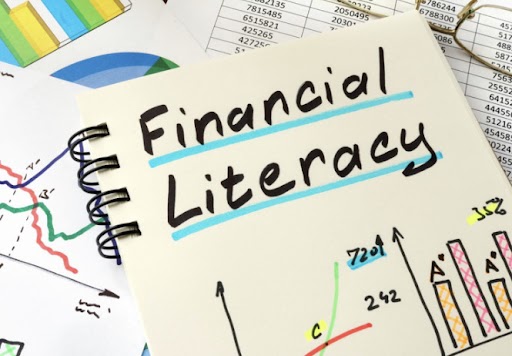
By Glory Aug, 25, 2022 Financial Terms
Financial products and services have expanded across
society more and more in recent decades. While prior generations might have
mostly paid cash for their purchases, different credit instruments, like credit
and debit cards and electronic transfers, are now widely used.
What
is financial literacy?
Financial literacy combines the understanding of
money, credit, and debt management required to make decisions that are
essential to our daily lives. Taking out loans, making a budget, and
comprehending the differences between various financial products are all
examples of financial literacy. In summary, individuals that are attempting to
balance their budget, purchase a home, pay for their children's education, or
secure an income in retirement are significantly impacted by financial
literacy.
Understanding
the fundamentals of financial literacy
Understanding and being proficient in the use of
different financial skills, such as investing, budgeting, and personal
financial management, is known as financial literacy. The cornerstone of the
relationship with money is laid out by financial literacy, which is a lifetime
learning process.
People in both economically developed
and emerging economies suffer from inadequate financial literacy.
Despite the possibility that financial literacy varies
with wealth and education levels, research demonstrates that customers with
high salaries and advanced degrees might be just as uninformed about money
matters as consumers with lower incomes and less education.
Financial illiteracy can result in a number of issues,
including a higher likelihood of building up unmanageable debt loads due to bad
spending choices or a lack of long-term planning. This can then result in bad
credit, bankruptcy, and other unfavorable outcomes.
Fortunately, those who want to gain knowledge and
skills in finance have access to more resources than ever.
Components
of Financial Literacy
Financial literacy can refer to a variety of
abilities, but some common examples include creating a household budget,
understanding how to manage and pay off debts, and weighing the pros and cons
of various credit and investment options. These abilities frequently call for
at least a basic understanding of important financial ideas like interest
compounding, investment returns, and the changing value of money.
i.
Budgeting
Spending less than what you make while planning
for your financial objectives is a sign of good budgeting. Making a budget is
the first step toward developing financial literacy and, in turn, achieving
financial security and freedom. Making a budget is the process of coming up
with a strategy for how to use and invest your finances effectively in
order to achieve your financial and personal goals. It is the outcome of a
self-evaluation of the relationship with money and serves as a vital
road map toward a higher level and quality of living.
If all spending is documented and scrutinized, one may
visualize the outcomes of their actions through figures.
ii.
Loans
Many people borrow money to pay for expenditures they
otherwise couldn't afford without extensive saving. When utilized
appropriately, loans can be excellent financial instruments, but they can also
be formidable foes. Before you start borrowing money from eager lenders, you
should have a basic understanding of how loans function and how lenders make
money in order to avoid getting into too much debt.
For college students, who will have more financial
options and possibilities than any previous generation, financial literacy and
loan management are crucial lifelong skills. Students need to be aware of their
obligations and rights both as consumers and as students.
iii.
Personal
Finance Management
Personal finance is the practice of budgeting, saving,
and spending money over time while taking into consideration various financial
risks and upcoming life events. It can be done by a person or a family unit.
Personal financial management, the most crucial
factor, combines the majority of the aforementioned elements. The above
financial combination must be balanced in order to strengthen and increase
income and savings while lowering borrowing and debt. A person's level of
financial literacy will rise as they get a thorough understanding of the financial
elements mentioned.
Benefits
of financial literacy
Financial literacy is a skill that offers a variety of
advantages that can raise people's standards of life by increasing their financial
security.
The advantages of having financial literacy are listed
below:
- ·
the capacity to make wiser financial
choices
- ·
effective debt and money management
- ·
more prepared to achieve financial
objectives
- ·
lowering costs through improved regulation
- ·
less anxiety and stress related to money
- ·
creating a planned budget with efficiency
Tags: Financial literacy Financial Illiteracy Personal Finance management budgeting Financial Products & services
Share On Facebook Twitter Linkedin Whatsapp Telegram
Categories
Latest Post
- Nigeria Taps Global Markets with $2.25B Eurobond Sale
- Boeing Shares Rise as CEO Confirms China Deliveries to Resume Next Month
- STOCK SPOTLIGHT: UNION HOMES REAL ESTATE INVESTMENT TRUST (UHREIT)
- Nvidia Q1 2025 Earnings Report Summary
- 📉 U.S. Market Summary – May 28, 2025
- CBN Launches New Financial Tools to Boost Nigeria’s Non-Interest Banking Sector! ✨
- Market Watch: Key Updates as Wall Street Awaits Nvidia and Salesforce Earnings
- U.S. Equity Markets Rally as EU Tariff Deadline Is Extended and Consumer Confidence Surges
- Things to Know Before the U.S. Stock Market Opens
- What to Expect in the Markets This Week (May 27–31)

Start investing with Acorns today! Get $5 when you use my invite link: Z24WWE
